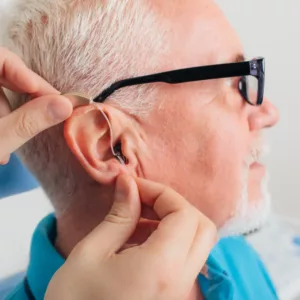Hearing Aid Usage: Can It Prolong Your Life?
Introduction to the Hearing Aid Usage Study
A recent landmark study in The Lancet Healthy Longevity highlights a vital link between hearing aid usage and a lower mortality risk. This research, led by Keck Medicine of USC, delves into the impact of hearing aids on extending life spans.
Hearing loss is a common issue in America, affecting around 40 million adults. Yet, a mere 10% of those who could benefit from hearing aids are actually using them. The findings of this study suggest that regular use of hearing aids could be more than a lifestyle choice—it could be a lifesaver.
Details from the Study
Lead researcher Janet Choi, MD, MPH, from Keck Medicine, emphasizes a striking discovery: “Adults who regularly use hearing aids have a 24% lower mortality risk than those who don’t.” This revelation is critical, especially considering prior research that associates untreated hearing loss with not only a reduced life span but also with social isolation, depression, and dementia.
This study represents the most comprehensive analysis of its kind in the U.S., examining the relationship between hearing loss, hearing aid usage, and longevity. The team utilized data from the National Health and Nutrition Examination Survey, focusing on nearly 10,000 adults over a decade following their hearing evaluations.
Of the adults with hearing loss, 237 were consistent hearing aid users, engaging with their devices for at least five hours weekly. The research consistently showed about a 25% lower risk of mortality for these regular users, irrespective of various factors like hearing loss severity, demographics, and medical history.
The study also noted that infrequent users of hearing aids did not show a significant difference in mortality risk compared to those who never used them, suggesting that occasional use might not yield substantial life-extending benefits.
Choi speculates that the link between hearing aids and longer life could be attributed to improved mental health and cognitive abilities resulting from enhanced hearing. Regular usage of hearing aids may reduce levels of depression and dementia, contributing to overall better health and potentially increasing life expectancy.
Hearing Aid Usage Even Benefits Those With Mild Hearing Loss
The recent study we discussed underscores a critical message: hearing aid usage is beneficial even for those with mild hearing loss. Let’s delve into why wearing hearing aids is a smart choice regardless of the severity or type of hearing loss.
Improved Speech Comprehension:
Mild hearing loss can challenge your ability to catch certain sounds, particularly in noisy settings. Hearing aids enhance speech frequencies, aiding in clearer conversation comprehension. This can boost your confidence and social engagement, reducing feelings of isolation and enhancing your quality of life.
Reduced Listening Effort:
With mild hearing loss, your brain has to work harder to interpret sounds. Hearing aids ease this burden. This leads to less fatigue, better concentration, and improved cognitive functions.
Enhanced Sound Quality:
Modern hearing aids do more than amplify sound. They refine and adjust it, offering a richer, more natural listening experience. This enhancement allows for a deeper appreciation of music, movies, and everyday sounds.
Overall Well-being:
Using hearing aids to address hearing loss significantly impacts overall well-being. They improve communication, reduce stress, and enhance cognitive function, contributing to a higher quality of life and emotional well-being.
Addressing Concerns:
People with mild hearing loss often hesitate to use hearing aids, worried about stigma or feeling they don’t need them yet. But remember, hearing aids are tools for enhancing hearing, similar to glasses for vision. Early intervention is crucial. Proactively addressing hearing loss can prevent further issues and maximize the benefits of “hearing aids extend life span” and “hearing aids prolong life.”
Incorporating hearing aids into your life, even for mild hearing loss, is a step towards not just better hearing but also a fuller, more connected life.

Hearing Aids Prolong Life Through Their Impact on Brain Health
The link between hearing loss and dementia risk is a growing area of research. Hearing aids not only improve hearing but also play a crucial role in maintaining brain health. Here’s how hearing aid usage contributes to cognitive well-being and potentially extends life span.
Improved Cognitive Function:
- Reduced listening effort: Hearing aids lessen the strain on your brain, conserving cognitive resources for tasks like memory and problem-solving.
- Brain stimulation: By supplying auditory information, hearing aids keep the brain active, potentially slowing cognitive decline and reducing dementia risk.
- Enhanced social interaction: Better hearing improves communication, fostering social engagement and combating factors like isolation contributing to cognitive decline.
Enhanced Hearing Processing:
- Advanced capabilities: Modern hearing aids filter background noise and focus on speech frequencies, aiding in more effective sound processing and understanding.
- Improved auditory memory: Clear hearing enhances the ability to remember sounds, which boosts overall cognitive function.
Overall Well-being:
- Stress reduction: Hearing aids relieve the mental and physical strain of struggling to hear, improving energy levels and well-being.
- Boosted confidence: Better hearing enhances self-esteem by facilitating active participation in conversations and activities, positively impacting mental health.
Discover more about hearing loss and mental health.
Brain Health Study
A study published in the June 2016 American Journal of Audiology reveals more about this connection. Led by Dr. Jamie Desjardins, assistant professor of speech-language pathology at the University of Texas at El Paso, it found that hearing aids improve brain function in individuals with hearing loss. Dr. Desjardins notes, “Hearing aids not only enhance hearing ability but also restore lost brain function.”
The study focused on participants in their 50s and 60s with bilateral sensorineural hearing loss who had never used hearing aids. After six months of consistent hearing aid use, the participants showed a 14% improvement in working memory, a 20% increase in selective attention, and a faster processing speed.
Despite over nine million older adults experiencing hearing loss, only about 20% who need hearing aids use them. On average, it takes people ten years from first noticing hearing loss symptoms to seeking treatment. Dr. Desjardins emphasizes the importance of considering the potential impact of hearing loss on cognitive performance, not just hearing ability.

Hearing Aids Extend Life Span Through Social Connection
Hearing aids are pivotal in reconnecting individuals with their social environment, extending their life span. Let’s explore how hearing aids can counteract the negative effects of social isolation, a common consequence of hearing loss.
Combating Social Isolation:
- Enhanced communication: Hearing aids improve the ability to participate in conversations, reducing the sense of isolation.
- Maintaining social connections: Better hearing facilitates engagement in social activities, which is crucial for emotional and mental health.
Humans are inherently social beings. We thrive on interactions like sharing stories, laughing together, and participating in communal activities. These profound or casual connections are vital for our emotional and brain health.
However, hearing loss can disrupt these connections. When someone struggles to hear, they might feel excluded, anxious, or depressed. This might be noticeable in your own social circles, where individuals with hearing loss appear disconnected from conversations.
As people with hearing loss withdraw from work and social activities, isolation sets in. Numerous studies indicate that this isolation negatively impacts brain health and cognition. After all, we can’t remember what we can’t hear.
Additional Benefits of Addressing Hearing Loss:
- Enjoying laughter: Laughter is therapeutic, but missing a joke means missing its mental health benefits.
- Reliving memories through music: Life’s soundtrack is full of songs that evoke memories, essential for maintaining the ear-to-brain connection.
- Finding purpose: Engaging in work, clubs, volunteering, or caring for grandchildren adds meaning to life. Hearing aids help maintain these purposeful activities, which can be hindered by hearing loss.
Hearing aid usage not only helps extend life span but also enriches life’s quality. They enable participation in life-enhancing activities, from simple daily conversations to enjoying music and laughter. Addressing hearing loss with hearing aids isn’t just about hearing better—it’s about living a fuller, more connected life.
Hearing Aid Usage and Physical Health
The benefits of hearing aid usage extend far beyond improved hearing; they also profoundly impact overall physical health. Here’s how incorporating hearing aids into your life can make you healthier.
Reduced Risk of Falls:
- Enhanced environmental awareness: Hearing aids improve your ability to detect sounds like approaching vehicles or uneven terrain, reducing fall risks.
- Prevention of injuries: By increasing awareness of your surroundings, hearing aids help prevent falls and related injuries.
Improved Balance and Mobility:
- Hearing loss and balance: There’s a link between hearing loss and balance issues, as the auditory system aids in maintaining equilibrium.
- Enhanced spatial awareness: Hearing aids improve perception of spatial cues, contributing to better balance and safer mobility.
Boosted Physical Activity:
- Overcoming isolation: Hearing loss can lead to withdrawal from social and physical activities.
- Increased engagement: Better hearing encourages participation in physical and social activities, enhancing overall health and fitness.
Reduced Stress and Improved Sleep:
- Alleviating mental strain: The effort to hear can be exhausting, leading to stress and fatigue.
- Better communication, better sleep: Hearing aids ease listening effort and improve communication, fostering better sleep and well-being.
Cardiovascular Health:
- Link to heart health: Some research indicates a possible connection between untreated hearing loss and cardiovascular issues, potentially due to stress and reduced social interaction.
- Hearing aids and heart health: Hearing aids might benefit cardiovascular health, although more research is needed for confirmation.
Overall Benefits of Hearing Aid Usage:
- Decreased fall risk and improved balance
- More physical and social activity
- Less stress and better sleep
- Possible cardiovascular health improvements
It’s important to note that these benefits can vary from person to person. Consulting a hearing specialist for a tailored assessment and exploring hearing aid options are critical steps in maximizing these benefits.
Additionally, people with hearing loss are often less active than those without hearing issues. This inactivity is from increased social withdrawal and balance difficulties. Studies have shown that hearing aid usage reduces the risk of fall-related injuries. Participants in auditory rehabilitation have reported improved fitness abilities. Furthermore, hearing aids help ease cognitive load, enhancing coordination and making tasks easier.
Learn more about what to look for in a hearing aid store.

Hearing Aid Usage Is Key for a Longer, Healthier Life
The power of hearing aid usage in extending and enhancing life is evident. From bolstering brain health to improving social connections and physical well-being, hearing aids are more than just devices for better hearing; they are tools for a fuller, healthier life.
If you or someone you know is experiencing hearing loss, don’t wait. Embracing hearing aid technology can open a world of improved health and well-being. Contact American Hearing + Audiology today to explore how hearing aid usage can extend and enrich your life. Choose to hear, live, and potentially extend your life span with the proper hearing solutions.



